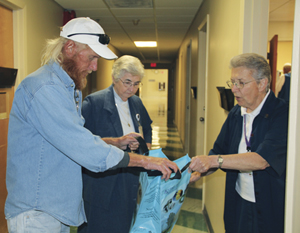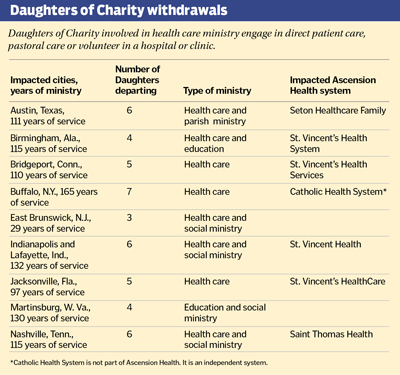Visit a photo slideshow to see more on the Daughters of Charity history.
By JULIE MINDA
Daughters of Charity sisters who are part of the Province of St. Louise will withdraw from 10 of the 70-plus cities the congregation serves. The transition will free up nearly 50 of the congregation's 512 sisters to serve in other cities where the province is identifying pressing unmet needs.
By relocating sisters to communities with fledgling ministries from locations with well-grounded ministries and sponsored works where the sisters have prepared the laity to carry on their charism, the Daughters of Charity, "will be closer to where the needs are," said Sr. Louise Gallahue, DC, provincial of the Province of St. Louise, based in St. Louis.

Sr. Patricia Nee, DC, Vincentian coordinator, at right, hands a Jacksonville, Fla., man a bag for gathering nonperishable items from the food pantry at St Vincent's Medical Center Riverside in Jacksonville. Looking on is Sr. Clare Marie Angermaier, DC. Both sister are departing Jacksonville as part of the withdrawal plan.
She likened the transition to the pruning of the vine described in Scripture. "This is needed to create new life — we are withdrawing" from some ministries to establish or grow others.
Within a year, Daughters of Charity will depart from:
- Austin, Texas
- Birmingham, Ala.
- Bridgeport, Conn.
- Buffalo, N.Y.
- East Brunswick, N.J.
- Indianapolis and Lafayette, Ind.
- Jacksonville, Fla.
- Martinsburg, W.Va.
- Nashville, Tenn.
Sisters in these cities serve in ministries including health care, social services, education, prison ministry, immigrant services, parish ministry and social justice advocacy. In many of the cities, the sisters serve at health care facilities that are part of St. Louis-based Ascension Health. The province now known as the Daughters of Charity, Province of St. Louise, is one of Ascension Health's founding sponsors.
A strategy for the future
Sr. Gallahue said the transition plan has been about two years in the making. In 2011, when four of the five Daughters of Charity provinces in the U.S. united to create the Province of St. Louise, the new province formed a task force of eight sisters to establish criteria to evaluate the ministries of the province's sisters and determine where their presence is needed most. The task force took into account the number of sisters serving in each locality, the ability to sustain the sisters' local presence given that the Daughters of Charity live in groups, and how prepared laity were to carry on the sisters' legacy absent the sisters' physical presence, according to a press release from the Daughters of Charity.
The task force presented a plan to the province's council recommending withdrawal from select mature ministries. The provincial councilors notified sisters who might be personally impacted, and it presented the plan to all the sisters in the province at a provincial meeting, inviting the sisters' feedback. The provincial council, the Daughters of Charity's governing body, refined the plan based on feedback. In September the province notified affected dioceses by letter of the withdrawals. Provincial councilors followed up personally with the bishops of the impacted dioceses and with senior leaders of affected facilities, including hospitals.

Specific details are not yet available about which sisters are heading where, Sr. Gallahue said. "The council will work with each transitioning Daughter of Charity to determine her future mission, always keeping the service to those living in greatest poverty in mind," said Sr. Gallahue. The new and existing ministries benefiting from the transfers may be in health care and social service. They may be in areas of heightened focus for the province, including helping immigrants and engaging in anti-human trafficking efforts. The new ministries may be in the U.S. or abroad.
St. Vincent de Paul, one of the Daughters of Charity's founders, said "we should be active and mobile," responding to needs, said Sr. Gallahue. "We want to be open to what's new in terms of priorities. We want to think more globally and more broadly" of how to serve the poor and vulnerable.
She said new areas of ministry may be in places "where no one else wants to go" such as in poor, rural areas. And the sisters likely will go where they have affiliated ministries or partners, such as communities where there is a Society of St. Vincent de Paul local conference or Vincentian priest presence.
Sr. Gallahue said the transition of sisters is in part a reasoned response to the declining numbers of active Daughters of Charity. There are not enough new sisters to succeed the sisters who are nearing or in retirement, or those who have died, said Sr. Gallahue.
Gasps and tears
The province's sisters "understand the direction we're going; they respect the process we've taken; and they're on board, but it's not easy to leave the places where you've been serving for many years," said Sr. Gallahue. The impacted sisters and their communities "feel the loss," she said.
Sr. Helen Brewer, DC, is vice chair of the board of trustees of the Seton Healthcare Family in Austin, part of Ascension Health. She is one of six Daughters of Charity who will be departing Austin. "There was an audible gasp when the announcement was first made to (Seton's) senior leaders," she said.
"There have been many tears, and much sadness," Sr. Brewer said. "There have also been some fears: What is going to happen? What will we do without the Daughters? Will Seton remain Catholic? Will we keep our mission …our focus on persons who are poor?" She said Seton's leaders have reassured those concerned, that Seton will remain Catholic and will continue the sisters' legacy.
Many Daughters of Charity who are relocating to other areas within the next year will continue many of their current responsibilities from their new home bases. This is the case for Sr. Brewer and others who serve in governance roles of health care facilities sponsored by Ascension Health.
A treasure
Sr. Gallahue, Sr. Brewer and Sr. Dinah White, DC, agree that in the cities the sisters are leaving, the laity in the various ministries have been preparing for the day the sisters would no longer be present. Sr. White, DC, advisor to the president of St. Vincent's Health System in Birmingham, an Ascension Health member system, said of her colleagues there, "They'll do fine, they're a committed and passionate group of people."
Ascension Health and its hospitals formally instruct lay leaders and staff in Catholic social teaching, the Ethical and Religious Directives for Catholic Health Care Services and other aspects of Catholic ministry. There are two-year formation programs for senior leaders and middle managers and reflection activities for all associates both at the system level and local level.
The Daughters' legacy of caring is a treasure that the sisters want to entrust to those with a true appreciation of its value, Sr. White said. She added that the laity "see the great trust we're giving them, in giving them this treasure."
Copyright © 2013 by the Catholic Health Association
of the United States
For reprint permission, contact Betty Crosby
or call (314) 253-3477.